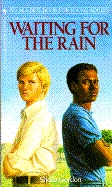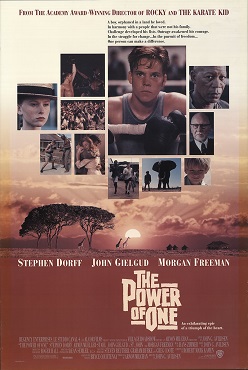
The Long Walk is a dystopian horror novel by American writer Stephen King, published in 1979, under the pseudonym Richard Bachman. It was collected in 1985 in the hardcover omnibus The Bachman Books, and has seen several reprints since, as both paperback and hardback. In 2023, Centipede Press released the first stand-alone hardcover edition.
Diné Bahaneʼ, is a Navajo creation story that describes the prehistoric emergence of the Navajo as a part of the Navajo religious beliefs. It centers on the area known as the Dinétah, the traditional homeland of the Navajo, and forms the basis of the traditional Navajo way of life and ceremony. Throughout the stories the importance of cardinal points and the number four are emphasized in multiple aspects.

"We Shall Overcome" is a gospel song that is associated heavily with the U.S. civil rights movement. The origins of the song are unclear; it was thought to have descended from "I'll Overcome Some Day," a hymn by Charles Albert Tindley, while the modern version of the song was first said to have been sung by tobacco workers led by Lucille Simmons during the 1945–1946 Charleston Cigar Factory strike in Charleston, South Carolina.

Walkabout is a 1971 adventure survival film directed by Nicolas Roeg and starring Jenny Agutter, Luc Roeg, and David Gulpilil. Edward Bond wrote the screenplay, which is loosely based on the 1959 novel by James Vance Marshall. It centres on two white schoolchildren who are left to fend for themselves in the Australian Outback and who come across a teenage Aboriginal boy who helps them to survive.

Bradley Glenn "Butch" Walker is an American singer-songwriter, musician, and record producer. He was the lead guitarist for the glam metal band SouthGang from the late 1980s to early 1990s and the lead vocalist and guitarist for the rock band Marvelous 3 from 1997 until 2001.

The "Black" Donnellys were an Irish Catholic immigrant family who settled in Biddulph township, Upper Canada, about 25 km northwest of London, in the 1840s. The family settled on a concession road which became known as the Roman Line due to its high concentration of Irish Catholic immigrants in the predominantly Protestant area. Many Irish Canadians arrived in the 19th century, many fleeing the Great Famine of Ireland (1845-52). The Donnellys' ongoing feuds with local residents culminated in an attack on the family's homestead by a vigilante mob on 4 February 1880, leaving five of the family dead and their farm burned to the ground. No one was convicted of the murders, despite two trials and a reliable eyewitness.

Forrest Alexander Gump is the title protagonist of the 1986 novel by Winston Groom, Robert Zemeckis' 1994 film of the same name, and Gump and Co., the written sequel to Groom's novel.

Black Joy is a 1977 British film directed by Anthony Simmons. The story of an immigrant country boy in Brixton, London. It was entered into the 1977 Cannes Film Festival.

Waiting for the Rain is a young adult novel by South African-born American writer Sheila Gordon, first published in 1987. It tells the story of two boys, one black and one white, growing up on a farm in South Africa during apartheid. As the boys mature, their friendship dissipates because the black boy seeks political equality while the white boy wants everything to stay the same.

In a Dark, Dark Room and Other Scary Stories is a collection of horror stories, poems and urban legends retold for children by Alvin Schwartz and illustrator Dirk Zimmer. It was published as part of the I Can Read! series in 1984. In 2017 the book was re-released with illustrations by Spanish freelance illustrator Victor Rivas. The book contains seven works: "The Teeth", "In the Graveyard", "The Green Ribbon", "In a Dark, Dark Room", "The Night It Rained", "The Pirate", and "The Ghost of John".

The Power of One is a 1992 drama film directed and edited by John G. Avildsen, loosely based on Bryce Courtenay's 1989 novel of the same title. The film stars Stephen Dorff, John Gielgud, Morgan Freeman, Armin Mueller-Stahl, and Daniel Craig in his feature film debut.

The League is an American television sitcom that aired on FX and later FXX from October 29, 2009, to December 9, 2015, for a total of seven seasons. The series, set in Chicago, is a semi-improvised comedy show about a fantasy football league, its members, and their everyday lives.

Brendan Brady is a fictional character from the British Channel 4 soap opera Hollyoaks, played by Emmett J. Scanlan. The character was introduced on 5 August 2010 by series producer Paul Marquess during part of the show's overhaul, and became one of Hollyoaks' most popular characters. He is easily recognised by his famous horseshoe moustache. He is the older half-brother of already established character Cheryl Brady. Following the announcement of Brendan's casting, he was quickly billed as the show's new "bad boy" character. Despite having the persona of a villain at the start of the show, as the show progressed the character was portrayed to be more of a tragic antihero. He made his final appearance on 22 March 2013.

The Flesh and Blood Show is a 1972 British horror slasher film directed and produced by Pete Walker, and starring Ray Brooks, Jenny Hanley, and Luan Peters. It follows a group of actors being stalked and murdered by an unseen assailant while rehearsing a play at a derelict seaside theatre.

Black Butterflies is an English-language Dutch drama film about the life of South-African Afrikaans poet and anti-apartheid political dissident Ingrid Jonker. The film was directed by Paula van der Oest and premiered in the Netherlands on February 6 before being released on 31 March 2011.

Morgan Jones is a fictional character from the comic book series The Walking Dead, portrayed by Lennie James in the American television series of the same name and its companion series Fear the Walking Dead. In both the comics and television series, he is a devoted father struggling to get over the recent death of his wife. He and his son, Duane, seek refuge in Rick's hometown after the outbreak occurs and are the first survivors that Rick encounters after awakening from his coma. Morgan is characterized by his catchphrase "you know what it is", which he repeats regularly throughout the television series.

House of Mortal Sin is a 1976 British horror slasher film directed and produced by Pete Walker. It was scripted by David McGillivray from a story by Walker. Its plot concerns a deranged priest who takes it upon himself to punish his parishioners for their moral transgressions.

The Begatting of the President is a satirical album narrated by Orson Welles, summarising the presidency of Lyndon B. Johnson and the election of 1968, leading up to the election of Richard Nixon, delivered in the style of Biblical verse.

Goosebumps The Musical: Phantom Of The Auditorium is a musical with book and lyrics by John Maclay, and music and lyrics by Danny Abosch. It is based on Phantom of the Auditorium, book 24 of the bestselling Goosebumps book series by R.L. Stine, published by Scholastic Publishing.

















